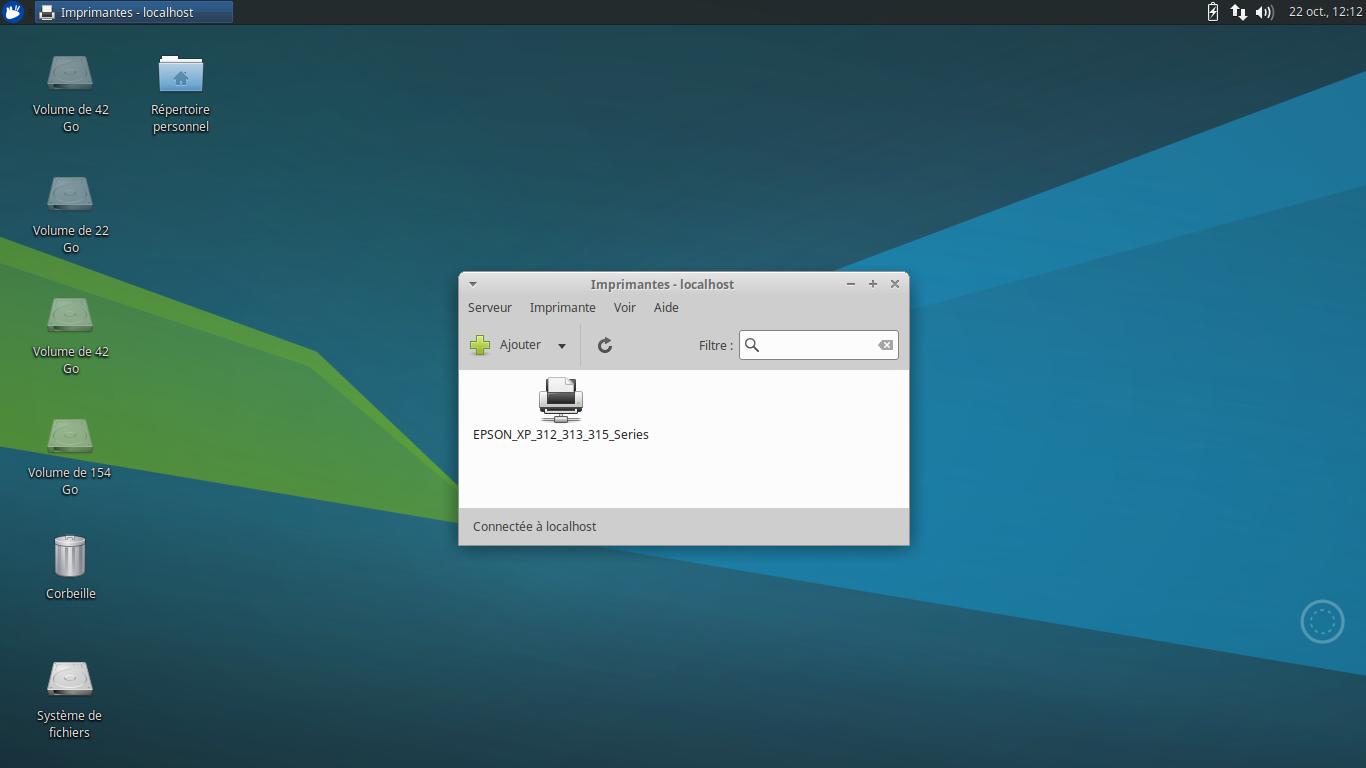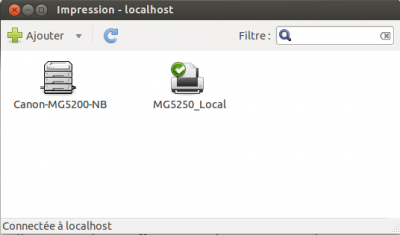As pointed out by @roland in the comments you may find that the easiest, cheapest, fastest, and most reliable way to get a USB WiFi connection on your Linux box is by using USB tethering with your smartphone.
- Driver developers/printer manufacturers. You may upload printer drivers directly through our website to have them included on our download pages as well as repositories for Linux distros.
- Canon is one of the largest printer manufacturer in the world, unfortunate canon never include linux / ubuntu driver in each product that we buy, in other words Printer driver only available in Windows and Machintos.
- Getting Started with Ubuntu 16.04 is a comprehensive beginners guide for the Ubuntu operating system. It is written under an open source license and is free for you to download, read, modify and share.
This is possible natively in Android. It is not possible with iOS unless iOS is jailbroken. iOS can share its cellular connection over USB natively, but not its WiFi connection unless it is jailbroken.
A Raspberry Pi 3 B+ (which supports 802.11ac 5Ghz) can also be used to accomplish a similar result, but using ethernet rather than USB.
I recommend considering some form of tethering before buying a USB WiFi device for the reasons explained below. Generally speaking, USB WiFi in Linux is a tricky thing to get right.
Read the Introduction in the Debian WiFi article before diving into Linux and USB WiFi devices. Also, feel free to read about my own experiences on this topic. I rewrote this article after a helpful commenter pointed out how problematic it is to recommend USB WiFi devices for Linux. Most manufacturers do not play well with Linux, with some notable exceptions.

Ever wonder some Amazon reviews have conflicting reports about Linux support? Read those articles I just listed! It is almost impossible to know which chipset one will receive when buying most USB WiFi devices except when buying 🐧 ThinkPenguin device.
Alpine Awall. CentOS 8. OpenSUSE. RHEL 8. Ubuntu 16.04. Ubuntu 18.04. Ubuntu 20.04: Network Utilities: dig. host. ip. nmap: OpenVPN: CentOS 7. CentOS 8. Debian 10. Debian 8/9. Ubuntu 18.04. Ubuntu 20.04: Package Manager: apk. apt: Processes Management: bg. chroot. cron. disown. fg.
I understand that ThinkPenguin devices may not be ideal for everyone. I am listing other, non-ThinkPenguin devices, that I have tested. However, for the reasons I stated above, it is a gamble whether or not they will work for everyone. ThinkPenguin devices are a much simpler option for Linux. Unfortunately, ThinkPenguin devices lack 802.11ac support and are a bit more expensive.
You are responsible for your own purchasing decisions and I make no guarantees!
This is not an exhaustive list. I have not purchased hundreds of cards. I have purchased several cards, and am ranking only the cards I own. As an average Linux user, I will do the best I can to relate what I found so that it may help others.
All cards were tested using Ubuntu 16.04.3 LTS Xenial Xerus 4.10.0-37-generic #41~16.04.1-Ubuntu SMP Fri Oct 6 22:42:59 UTC 2017 against a server running iperf 3.0.11. Each test was performed over a period of 4 hours. See my wifi-testing repo if you are interested.
Chipset: AR9271
Driver: ath9k_htc
The TPE-N150USB performed very reliably in my tests. Download speeds averaged 31.16 Mbps and upload speeds averaged 11.58 Mbps. The max speeds never topped 40.0 Mbps, but I found that the overall consistency in performance was stellar.
Ubuntu Imprimante Canon
From the research I have done, I would say this is going to be the most reliable Linux supported mini USB WiFi networking interface a consumer can except to find.
This card is supported by the Linux Kernel, which means that no special intervention is required to get this NIC to work. Just plug it in. It also supports Monitor mode, which is great for security analysis. Since ThinkPenguin uses reliable chipsets we can have confidence that we will receive the chipset that was advertised.
This card is my favorite considering the size, performance consistency, and Linux support.
Download Tests
Upload Tests
Chipset: AR9271
Driver: ath9k_htc
The TPE-N150USBL performed very reliably in my tests. Download speeds averaged 32.25 Mbps and upload speeds averaged 17.35 Mbps. The max speeds never topped 40.0 Mbps, but I found that the overall consistency in performance was stellar.
This card seems to be almost identical to the TPE-N150USB. Both cards use the same chipset, same vendor ids, same product ids, and had almost identical performance statistics. This card was a tad faster, but it seems the difference in speeds is very slight. The external antenna on the TPE-N150USBL did not make much difference in testing. In my opinion, this card is not worth the additional cost compared to the TPE-N150USB.
This card is supported by the Linux Kernel, which means that no special intervention is required to get this NIC to work. Just plug it in. It also supports Monitor mode, which is great for security analysis. Since ThinkPenguin uses reliable chipsets we can have confidence that we will receive the chipset that was advertised.
Download Tests
Upload Tests
Potential Chipsets: RTL8811AU
Potential Drivers: scrivy/rtl8812au, diederikdehaas/rtl8812AU, gordboy/rtl8812au, abperiasamy/rtl8812AU_8821AU_linux, gnab/rtl8812au, sloretz/rtl8811au, Edimax, rtl8812au-dkms
Purchasing this card means there is no guarantee that anyone will receive the same chipset I received, as I state in the warnings above. Performance and support for this card will vary based on which chipset it ships with.
Getting this device to work on Linux was complicated. There aremultipledrivers by multipleauthors for this chipset. None of these linked drivers worked for me.
I tried multiple variations of the official Edimax driver code, but none of the Edimax drivers built successfully for me, and I did not want to spend time debugging their build scripts.
I found that the Ubuntu package for this driver would not build on my (vanilla) Ubuntu install either.
This article finally helped me find a working driver. For me, the working driver was the rtl8812AU_8821AU_linux driver by scrivy.
Once working, this card seemed blazing fast (relative to other Linux WiFi adapters that I tested) for me on Ubuntu 16.04.3. The performance boost came from 802.11ac. With 802.11ac I saw download speeds average 64.16 Mbps and upload speeds average 59.42 Mbps.
Overall, the performance of this card seemed very reliable for me.
Please note this is clearly not a well supported device on Linux, there are risks in downloading software from random repos, there are multiple versions of this device sold by Edimax, I only tested on Ubuntu, others may well receive a different chipset that I did, and there is no guarantee this card will work for everyone.
This is the only 802.11ac card I tested. Speeds are all for my 802.11ac network.
Download Tests
Upload Tests
Potential Chipsets: RT5372
Potential Drivers: rt2800usb
Purchasing this card means there is no guarantee that anyone will receive the same chipset I received, as I state in the warnings above. Performance and support for this card will vary based on which chipset it ships with.
This card (at least, the one that I received) uses a reasonably common chipset, and so a reasonably well supported Linux driver out of the box on Ubuntu 16.04.3.
It is relatively cheap, worked out of the box, and connected to my AP without issue. The chipset I received supports monitor mode, but it is very likely others who buy this card may not have a chipset that supports monitor mode. Compared to the other cards here, I would say the performance is very unreliable.
Just look at the wide range of download and upload speeds below. I re-ran these tests multiple times at different times of day (and overnight) and the speeds are very inconsistent in all test cases.
I have only seen one reported chipset for this device in my research, but as I warn multiple times, that is no guarantee that the card others receive will have the same chipset as mine.
Download Tests
Upload Tests
Potential Chipsets: RT3070, Atheros ?, RT2870, RT5732
Potential Drivers: rt2800usb
Purchasing this card means there is no guarantee that anyone will receive the same chipset I received, as I state in the warnings above. Performance and support for this card will vary based on which chipset it ships with.
This card (at least, the one that I received) uses a reasonably common chipset, and so a reasonably well supported Linux driver out of the box on Ubuntu 16.04.3.
It is relatively cheap, worked out of the box, and connected to my AP without issue. The chipset I received supports monitor mode, but it is very likely others who buy this card may not have a chipset that supports monitor mode. Compared to the other cards here, I would say the performance is very unreliable.
Just look at the wide range of download and upload speeds below. I re-ran these tests multiple times at different times of day (and overnight) and the speeds are very inconsistent in all test cases.
I have seen multiple reported chipset for this device in my research, and as I warn multiple times, there is no guarantee that the card others receive will have the same chipset as mine.
Download Tests
Upload Tests

Imprimante Ubuntu Driver
About the manual

Getting Started with Ubuntu 16.04 is a comprehensive beginners guide for the Ubuntu operating system. It is written under an open source license and is free for you to download, read, modify and share.
The manual will help you become familiar with everyday tasks such as surfing the web, listening to music and scanning documents. With an emphasis on easy to follow instructions, it is suitable for all levels of experience.
Easy to understand - our manual has step by step instructions and is jargon-free
A picture is worth a thousand words - lots of screenshots to show you how to do tasks
All in one place - conveniently located in one file, so you don’t have to look all over the web for help

Progressive learning curve - start with the basics, and learn as you work through each chapter
Imprimante Ubuntu Command
Dozens of languages - translated into more than 52 languages, including localized screenshots
CC-BY-SA licensing - download, modify, reproduce and share as much as you like
No cost - our documents are all written by Ubuntu community members and there is no charge to use them
Imprimante Ubuntu Download
Printer friendly - we have a version optimized for printing to save the trees
Troubleshooting section - to help you solve common Ubuntu problems quickly




